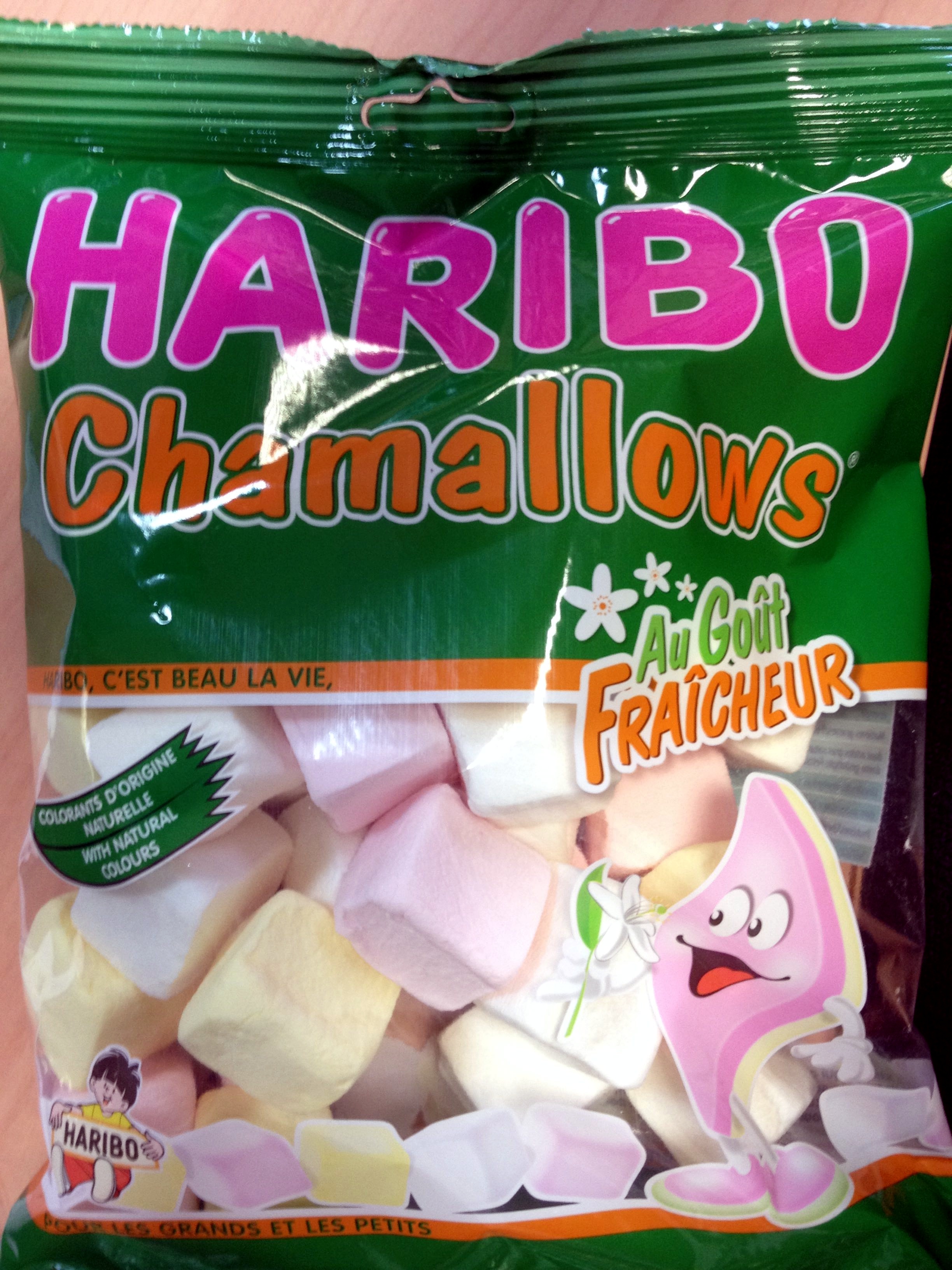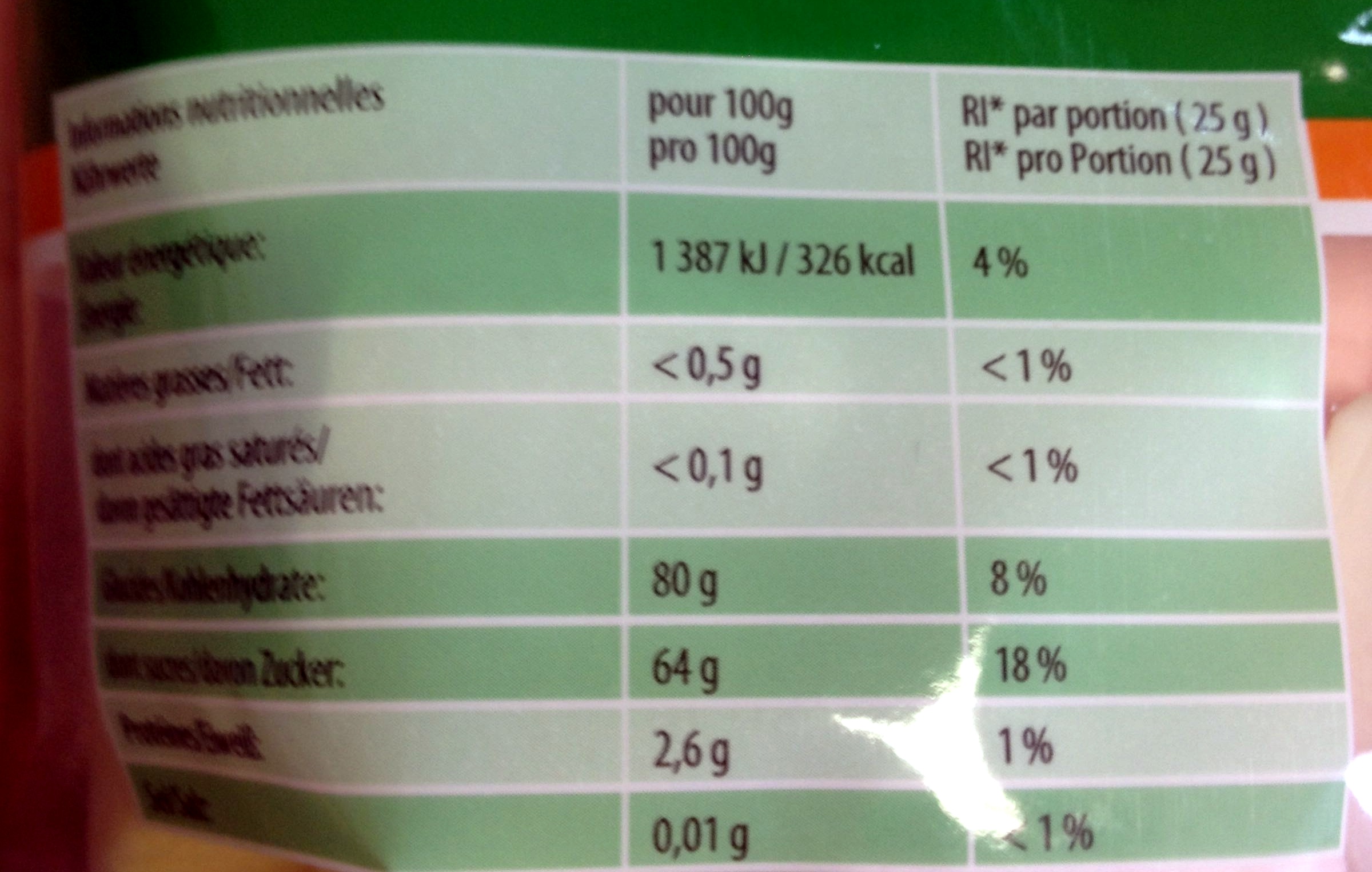Help us make food transparency the norm!
As a non-profit organization, we depend on your donations to continue informing consumers around the world about what they eat.
The food revolution starts with you!
Chamallows au goût fraîcheur - Haribo - 200g
Chamallows au goût fraîcheur - Haribo - 200g
This product page is not complete. You can help to complete it by editing it and adding more data from the photos we have, or by taking more photos using the app for Android or iPhone/iPad. Thank you!
×
Barcode: 3103220006634 (EAN / EAN-13)
Common name: Confiserie guimauve fantaisie
Quantity: 200g
Packaging: Plastic
Brands: Haribo
Categories: Snacks, Sweet snacks, Confectioneries, Candies, Marshmallows
Labels, certifications, awards: Natural colorings
Countries where sold: France, French Guiana
Matching with your preferences
Health
Ingredients
-
14 ingredients
: sirop de glucose, sucre, eau, gélatine, humectant : sirop de sorbitol, maltodextrine, amidon, acidifiant : acide citrique, arôme, colorants : curcumine, carmins.
Food processing
-
Ultra processed foods
Elements that indicate the product is in the 4 - Ultra processed food and drink products group:
- Additive: E100 - Curcumin
- Additive: E120 - Cochineal
- Additive: E420 - Sorbitol
- Additive: E428 - Gelatine
- Ingredient: Colour
- Ingredient: Flavouring
- Ingredient: Glucose
- Ingredient: Glucose syrup
- Ingredient: Humectant
- Ingredient: Maltodextrin
Food products are classified into 4 groups according to their degree of processing:
- Unprocessed or minimally processed foods
- Processed culinary ingredients
- Processed foods
- Ultra processed foods
The determination of the group is based on the category of the product and on the ingredients it contains.
Additives
-
E120 - Cochineal
Carminic acid: Carminic acid -C22H20O13- is a red glucosidal hydroxyanthrapurin that occurs naturally in some scale insects, such as the cochineal, Armenian cochineal, and Polish cochineal. The insects produce the acid as a deterrent to predators. An aluminum salt of carminic acid is the coloring agent in carmine. Synonyms are C.I. 75470 and C.I. Natural Red 4. The chemical structure of carminic acid consists of a core anthraquinone structure linked to a glucose sugar unit. Carminic acid was first synthesized in the laboratory by organic chemists in 1991.Source: Wikipedia
-
E330 - Citric acid
Citric acid is a natural organic acid found in citrus fruits such as lemons, oranges, and limes.
It is widely used in the food industry as a flavor enhancer, acidulant, and preservative due to its tart and refreshing taste.
Citric acid is safe for consumption when used in moderation and is considered a generally recognized as safe (GRAS) food additive by regulatory agencies worldwide.
-
E420 - Sorbitol
Sorbitol: Sorbitol --, less commonly known as glucitol --, is a sugar alcohol with a sweet taste which the human body metabolizes slowly. It can be obtained by reduction of glucose, which changes the aldehyde group to a hydroxyl group. Most sorbitol is made from corn syrup, but it is also found in nature, for example in apples, pears, peaches, and prunes. It is converted to fructose by sorbitol-6-phosphate 2-dehydrogenase. Sorbitol is an isomer of mannitol, another sugar alcohol; the two differ only in the orientation of the hydroxyl group on carbon 2. While similar, the two sugar alcohols have very different sources in nature, melting points, and uses.Source: Wikipedia
-
E420ii - Sorbitol syrup
Sorbitol: Sorbitol --, less commonly known as glucitol --, is a sugar alcohol with a sweet taste which the human body metabolizes slowly. It can be obtained by reduction of glucose, which changes the aldehyde group to a hydroxyl group. Most sorbitol is made from corn syrup, but it is also found in nature, for example in apples, pears, peaches, and prunes. It is converted to fructose by sorbitol-6-phosphate 2-dehydrogenase. Sorbitol is an isomer of mannitol, another sugar alcohol; the two differ only in the orientation of the hydroxyl group on carbon 2. While similar, the two sugar alcohols have very different sources in nature, melting points, and uses.Source: Wikipedia
Ingredients analysis
-
Palm oil free
No ingredients containing palm oil detected
-
Non-vegan
Non-vegan ingredients: E428, E120
-
Non-vegetarian
Non-vegetarian ingredients: E428, E120
-
Details of the analysis of the ingredients
: sirop de glucose, sucre, eau, gélatine, humectant (sirop de sorbitol), maltodextrine, amidon, acidifiant (acide citrique), arôme, colorants (curcumine), carmins- sirop de glucose -> en:glucose-syrup - vegan: yes - vegetarian: yes - ciqual_proxy_food_code: 31016 - percent_min: 9.09090909090909 - percent_max: 100
- sucre -> en:sugar - vegan: yes - vegetarian: yes - ciqual_proxy_food_code: 31016 - percent_min: 0 - percent_max: 50
- eau -> en:water - vegan: yes - vegetarian: yes - ciqual_food_code: 18066 - percent_min: 0 - percent_max: 33.3333333333333
- gélatine -> en:e428 - vegan: no - vegetarian: no - percent_min: 0 - percent_max: 25
- humectant -> en:humectant - percent_min: 0 - percent_max: 20
- sirop de sorbitol -> en:e420ii - vegan: yes - vegetarian: yes - percent_min: 0 - percent_max: 20
- maltodextrine -> en:maltodextrin - vegan: yes - vegetarian: yes - percent_min: 0 - percent_max: 16.6666666666667
- amidon -> en:starch - vegan: yes - vegetarian: yes - ciqual_proxy_food_code: 9510 - percent_min: 0 - percent_max: 14.2857142857143
- acidifiant -> en:acid - percent_min: 0 - percent_max: 12.5
- acide citrique -> en:e330 - vegan: yes - vegetarian: yes - percent_min: 0 - percent_max: 12.5
- arôme -> en:flavouring - vegan: maybe - vegetarian: maybe - percent_min: 0 - percent_max: 5
- colorants -> en:colour - percent_min: 0 - percent_max: 5
- curcumine -> en:e100 - vegan: yes - vegetarian: yes - percent_min: 0 - percent_max: 5
- carmins -> en:e120 - vegan: no - vegetarian: no - percent_min: 0 - percent_max: 5
Nutrition
-
Poor nutritional quality
⚠ ️Warning: the amount of fruits, vegetables and nuts is not specified on the label, it was estimated from the list of ingredients: 0This product is not considered a beverage for the calculation of the Nutri-Score.
Positive points: 0
- Proteins: 1 / 5 (value: 2.6, rounded value: 2.6)
- Fiber: 0 / 5 (value: 0, rounded value: 0)
- Fruits, vegetables, nuts, and colza/walnut/olive oils: 0 / 5 (value: 0, rounded value: 0)
Negative points: 14
- Energy: 4 / 10 (value: 1387, rounded value: 1387)
- Sugars: 10 / 10 (value: 64, rounded value: 64)
- Saturated fat: 0 / 10 (value: 0.1, rounded value: 0.1)
- Sodium: 0 / 10 (value: 4.00304, rounded value: 4)
The points for proteins are not counted because the negative points are greater or equal to 11.
Nutritional score: (14 - 0)
Nutri-Score:
-
Nutrient levels
-
Fat in low quantity (0.5%)
What you need to know- A high consumption of fat, especially saturated fats, can raise cholesterol, which increases the risk of heart diseases.
Recommendation: Limit the consumption of fat and saturated fat- Choose products with lower fat and saturated fat content.
-
Saturated fat in low quantity (0.1%)
What you need to know- A high consumption of fat, especially saturated fats, can raise cholesterol, which increases the risk of heart diseases.
Recommendation: Limit the consumption of fat and saturated fat- Choose products with lower fat and saturated fat content.
-
Sugars in high quantity (64%)
What you need to know- A high consumption of sugar can cause weight gain and tooth decay. It also augments the risk of type 2 diabetes and cardio-vascular diseases.
Recommendation: Limit the consumption of sugar and sugary drinks- Sugary drinks (such as sodas, fruit beverages, and fruit juices and nectars) should be limited as much as possible (no more than 1 glass a day).
- Choose products with lower sugar content and reduce the consumption of products with added sugars.
-
Salt in low quantity (0.01%)
What you need to know- A high consumption of salt (or sodium) can cause raised blood pressure, which can increase the risk of heart disease and stroke.
- Many people who have high blood pressure do not know it, as there are often no symptoms.
- Most people consume too much salt (on average 9 to 12 grams per day), around twice the recommended maximum level of intake.
Recommendation: Limit the consumption of salt and salted food- Reduce the quantity of salt used when cooking, and don't salt again at the table.
- Limit the consumption of salty snacks and choose products with lower salt content.
-
-
Nutrition facts
Nutrition facts As sold
for 100 g / 100 mlAs sold
per serving (25 g)Compared to: Marshmallows Energy 1,387 kj
(326 kcal)347 kj
(81 kcal)-4% Fat < 0.5 g < 0.125 g -71% Saturated fat < 0.1 g < 0.025 g -91% Carbohydrates 80 g 20 g +3% Sugars 64 g 16 g +1% Fiber 0 g 0 g -100% Proteins 2.6 g 0.65 g -25% Salt 0.01 g 0.002 g -88% Fruits‚ vegetables‚ nuts and rapeseed‚ walnut and olive oils (estimate from ingredients list analysis) 0 % 0 %
Environment
-
Eco-Score B - Low environmental impact
⚠ ️Select a country in order to include the full impact of transportation.The Eco-Score is an experimental score that summarizes the environmental impacts of food products.→ The Eco-Score was initially developped for France and it is being extended to other European countries. The Eco-Score formula is subject to change as it is regularly improved to make it more precise and better suited to each country.Life cycle analysis
-
Average impact of products of the same category: A (Score: 88/100)
Category: Candies, marshmallows
Category: Candies, marshmallows
- PEF environmental score: 0.22 (the lower the score, the lower the impact)
- including impact on climate change: 1.63 kg CO2 eq/kg of product
Stage Impact Agriculture
52.0 %Processing
31.6 %Packaging
7.2 %Transportation
7.0 %Distribution
2.1 %Consumption
0.0 %
Bonuses and maluses
-
Missing origins of ingredients information
Malus: -5
⚠ ️ The origins of the ingredients of this product are not indicated.
If they are indicated on the packaging, you can modify the product sheet and add them.
If you are the manufacturer of this product, you can send us the information with our free platform for producers.
-
Packaging with a medium impact
Malus: -10
Shape Material Recycling Impact Unknown Plastic High ⚠ ️ The information about the packaging of this product is not sufficiently precise (exact shapes and materials of all components of the packaging).⚠ ️ For a more precise calculation of the Eco-Score, you can modify the product page and add them.
If you are the manufacturer of this product, you can send us the information with our free platform for producers.
Eco-Score for this product
-
Impact for this product: B (Score: 73/100)
Product: Chamallows au goût fraîcheur - Haribo - 200g
Life cycle analysis score: 88
Sum of bonuses and maluses: -15
Final score: 73/100
-
Carbon footprint
-
Equal to driving 0.8 km in a petrol car
163 g CO² per 100g of product
The carbon emission figure comes from ADEME's Agribalyse database, for the category: Candies, marshmallows (Source: ADEME Agribalyse Database)
Stage Impact Agriculture
36.7 %Processing
39.2 %Packaging
11.4 %Transportation
11.6 %Distribution
1.1 %Consumption
0.0 %
Packaging
-
Packaging with a medium impact
-
Packaging parts
(Plastic)
-
Packaging materials
Material % Packaging weight Packaging weight per 100 g of product Plastic
-
Transportation
-
Origins of ingredients
Missing origins of ingredients information
⚠ ️ The origins of the ingredients of this product are not indicated.
If they are indicated on the packaging, you can modify the product sheet and add them.
If you are the manufacturer of this product, you can send us the information with our free platform for producers.Add the origins of ingredients for this product Add the origins of ingredients for this product
Report a problem
-
Incomplete or incorrect information?
Category, labels, ingredients, allergens, nutritional information, photos etc.
If the information does not match the information on the packaging, please complete or correct it. Open Food Facts is a collaborative database, and every contribution is useful for all.
Data sources
Product added on by openfoodfacts-contributors
Last edit of product page on by telperion87.
Product page also edited by dimitri, jeanbono, packbot, quechoisir.










